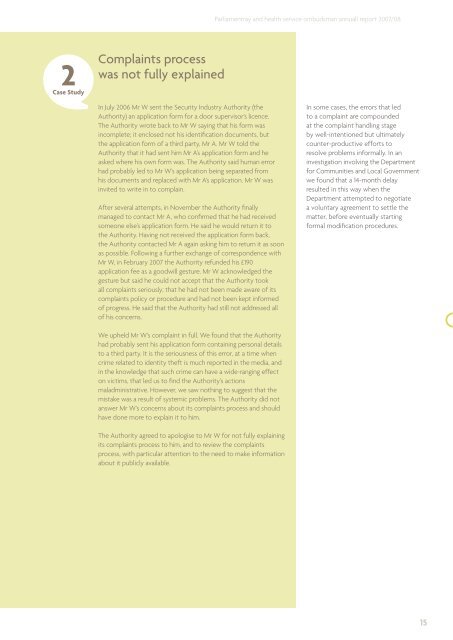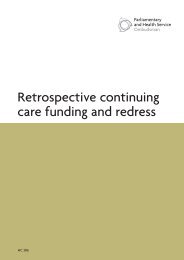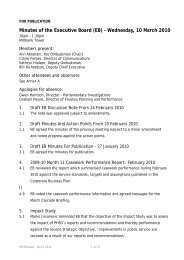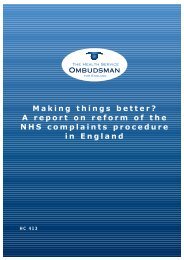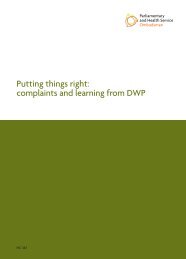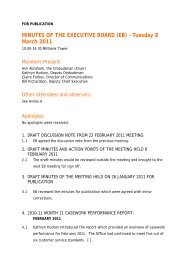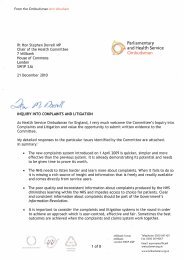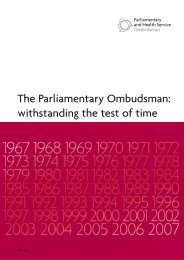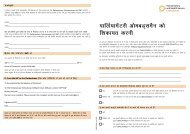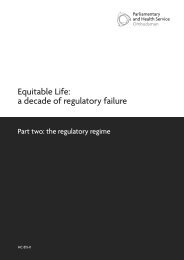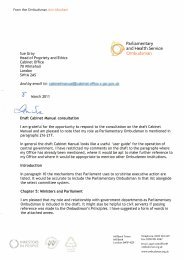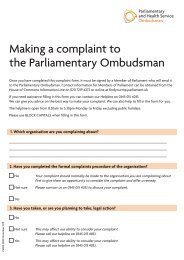Individual <strong>and</strong> public benefitOur <strong>Parliamentary</strong> work during <strong>2007</strong>-<strong>08</strong>clearly illustrated <strong>the</strong> dual aspect of<strong>the</strong> Ombudsman’s role in achievingremedy in individual cases, while alsoproviding wider public benefit. Thiswider benefit stems from <strong>the</strong> effectiveuse of our evidence base <strong>and</strong> ourexpertise in providing a high qualitycomplaint h<strong>and</strong>ling service, toge<strong>the</strong>rwith an acknowledged reputation forindependence <strong>and</strong> impartiality. Thisenables us to provide expertise in goodadministration <strong>and</strong> good complainth<strong>and</strong>ling, drive improvements in publicservice delivery <strong>and</strong> inform public policy,demonstrating that <strong>the</strong> Ombudsman notonly provides a retrospective remedy forinjustice resulting from maladministration,but also seeks to secure prospectiveimprovements in <strong>the</strong> wider public interest.This approach was evident in <strong>the</strong> workwe undertook in relation to <strong>the</strong> threebodies that attracted <strong>the</strong> mostcomplaints in <strong>the</strong> year:• In relation to Her Majesty’s Revenue& Customs, including <strong>the</strong> Adjudicator’sOffice, we reported on 54 tax creditinvestigations in <strong>the</strong> year <strong>and</strong> alsopublished our second special reporton <strong>the</strong> subject, Tax Credits: Gettingit wrong?, making recommendationsfor systemic change, all of which wereaccepted.• In relation to <strong>the</strong> Department forWork <strong>and</strong> Pensions <strong>and</strong> its agencieswe reported on 98 cases relating to118 complaints. We also welcomed<strong>the</strong> extension of <strong>the</strong> remit of DWP’sIndependent Case Examiner to includeall of DWP’s customer-facing agencies,something <strong>the</strong> Ombudsman hadrecommended as far back as 2003.• In relation to <strong>the</strong> Border <strong>and</strong>Immigration Agency we reported on52 investigations in <strong>the</strong> year <strong>and</strong>, in aseries of liaison meetings with <strong>the</strong>Chief Executive of <strong>the</strong> Agency, madestrong representations about <strong>the</strong> needfor a more robust <strong>and</strong> effective systemfor h<strong>and</strong>ling complaints.More detail is given later about <strong>the</strong> workwe undertook with <strong>the</strong>se three majorbodies during <strong>the</strong> year.A Framework of PrinciplesAfter wide consultation, in October <strong>2007</strong>we published our Principles for Remedy,which offer complementary guidance toour Principles of Good Administration,published in March <strong>2007</strong>. The Principlesfor Remedy follow <strong>the</strong> same six Principlesas our Principles of Good Administration:• Getting it right• Being customer focused• Being open <strong>and</strong> accountable• Acting fairly <strong>and</strong> proportionately• Putting things right• Seeking continuous improvement.Principles for Remedy gives our viewof <strong>the</strong> Principles that should guide publicbodies in providing remedies for injusticeresulting from <strong>the</strong>ir maladministration.We want public bodies to be fair <strong>and</strong> takeresponsibility, acknowledge failures <strong>and</strong>apologise for <strong>the</strong>m, make amends <strong>and</strong> use<strong>the</strong> opportunity to improve <strong>the</strong>ir services.During <strong>2007</strong>-<strong>08</strong> we developed <strong>the</strong> thirdin our series of Principles, which we havebeen consulting on in recent months <strong>and</strong>will publish in autumn 20<strong>08</strong>. OurPrinciples of Good Complaint H<strong>and</strong>lingare based on <strong>the</strong> same six core Principlesas our Principles of Good Administration<strong>and</strong> Principles for Remedy. With <strong>the</strong>m weaim to ensure that public bodiesunderst<strong>and</strong> how we expect complaintsto be h<strong>and</strong>led, <strong>and</strong> that complainantsunderst<strong>and</strong> how we will consider <strong>the</strong>ircases. As with <strong>the</strong> existing Principles, wehope that <strong>the</strong>y will prove useful to bothcomplaint h<strong>and</strong>lers <strong>and</strong> complainants.Poor complaint h<strong>and</strong>ling by publicbodies was a recurrent <strong>the</strong>me across our<strong>Parliamentary</strong> investigations in <strong>2007</strong>-<strong>08</strong>,<strong>and</strong> one we refer to frequently in <strong>the</strong>pages that follow. Often, <strong>the</strong> failureto provide an adequate remedy is anelement of poor complaint h<strong>and</strong>ling, <strong>and</strong>is a significant factor in <strong>the</strong> complainant’sdecision to refer <strong>the</strong> complaint to us forinvestigation, as in <strong>the</strong> following example.Poor complaint h<strong>and</strong>lingOur investigation into <strong>the</strong> case ofMr W, a worker in <strong>the</strong> security industry,upheld his complaint that <strong>the</strong> SecurityIndustry Authority had not properlyh<strong>and</strong>led his complaint about a lostapplication <strong>and</strong> had failed to explainits procedure to him adequately.As a result of our investigation, <strong>the</strong>Security Industry Authority not onlyagreed to put things right for Mr W,but also accepted our recommendationthat it review its complaints processto prevent a recurrence of <strong>the</strong> problemsMr W had experienced.14
Parliamentray <strong>and</strong> health service ombudsman annuall report <strong>2007</strong>/<strong>08</strong>2Case StudyComplaints processwas not fully explainedIn July 2006 Mr W sent <strong>the</strong> Security Industry Authority (<strong>the</strong>Authority) an application form for a door supervisor’s licence.The Authority wrote back to Mr W saying that his form wasincomplete; it enclosed not his identification documents, but<strong>the</strong> application form of a third party, Mr A. Mr W told <strong>the</strong>Authority that it had sent him Mr A’s application form <strong>and</strong> heasked where his own form was. The Authority said human errorhad probably led to Mr W’s application being separated fromhis documents <strong>and</strong> replaced with Mr A’s application. Mr W wasinvited to write in to complain.After several attempts, in November <strong>the</strong> Authority finallymanaged to contact Mr A, who confirmed that he had receivedsomeone else’s application form. He said he would return it to<strong>the</strong> Authority. Having not received <strong>the</strong> application form back,<strong>the</strong> Authority contacted Mr A again asking him to return it as soonas possible. Following a fur<strong>the</strong>r exchange of correspondence withMr W, in February <strong>2007</strong> <strong>the</strong> Authority refunded his £190application fee as a goodwill gesture. Mr W acknowledged <strong>the</strong>gesture but said he could not accept that <strong>the</strong> Authority tookall complaints seriously; that he had not been made aware of itscomplaints policy or procedure <strong>and</strong> had not been kept informedof progress. He said that <strong>the</strong> Authority had still not addressed allof his concerns.In some cases, <strong>the</strong> errors that ledto a complaint are compoundedat <strong>the</strong> complaint h<strong>and</strong>ling stageby well-intentioned but ultimatelycounter-productive efforts toresolve problems informally. In aninvestigation involving <strong>the</strong> Departmentfor Communities <strong>and</strong> Local Governmentwe found that a 14-month delayresulted in this way when <strong>the</strong>Department attempted to negotiatea voluntary agreement to settle <strong>the</strong>matter, before eventually startingformal modification procedures.We upheld Mr W’s complaint in full. We found that <strong>the</strong> Authorityhad probably sent his application form containing personal detailsto a third party. It is <strong>the</strong> seriousness of this error, at a time whencrime related to identity <strong>the</strong>ft is much reported in <strong>the</strong> media, <strong>and</strong>in <strong>the</strong> knowledge that such crime can have a wide-ranging effecton victims, that led us to find <strong>the</strong> Authority’s actionsmaladministrative. However, we saw nothing to suggest that <strong>the</strong>mistake was a result of systemic problems. The Authority did notanswer Mr W’s concerns about its complaints process <strong>and</strong> shouldhave done more to explain it to him.The Authority agreed to apologise to Mr W for not fully explainingits complaints process to him, <strong>and</strong> to review <strong>the</strong> complaintsprocess, with particular attention to <strong>the</strong> need to make informationabout it publicly available.15


